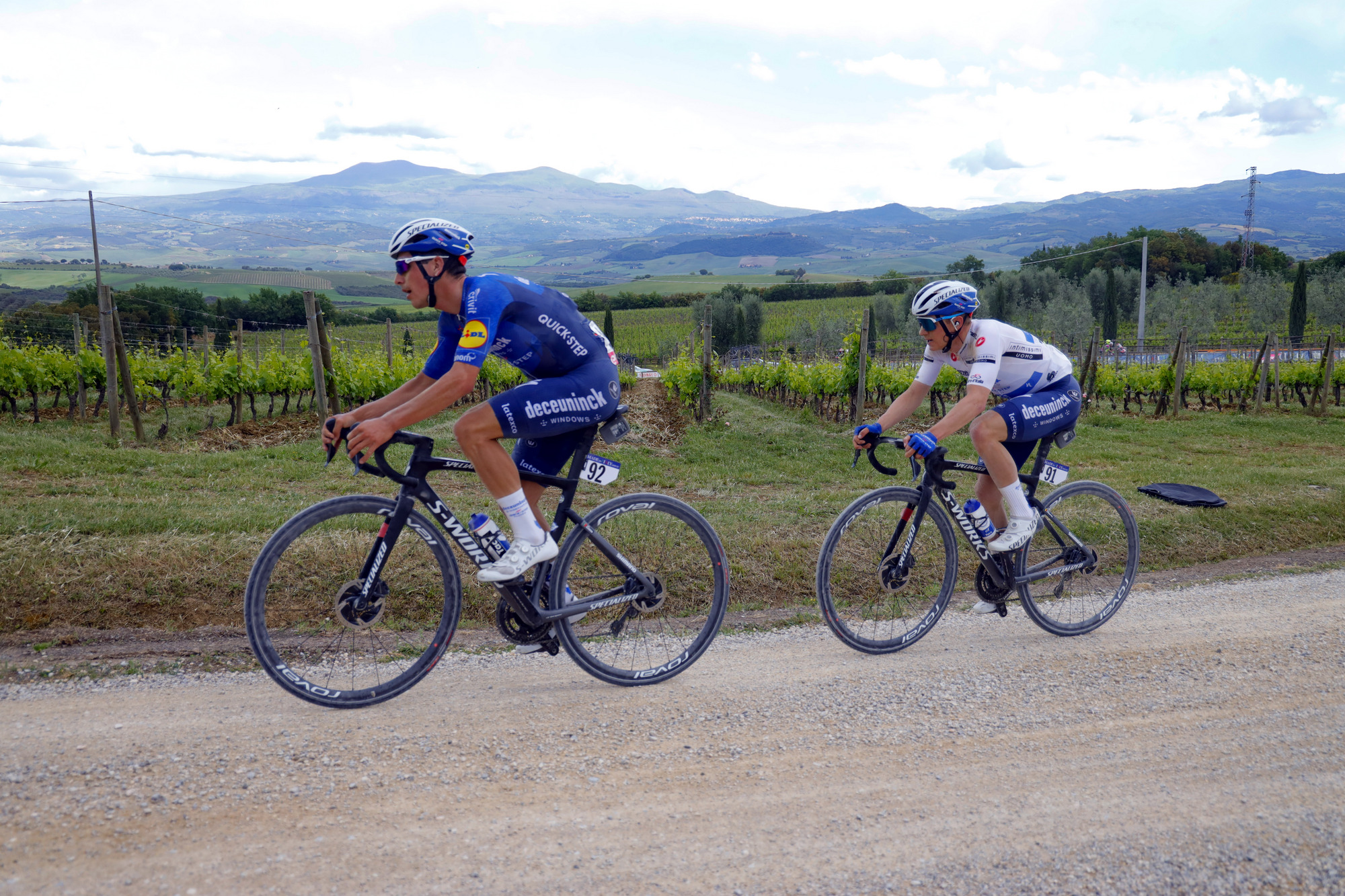Evenepoel staying confident despite Giro d'Italia defeat
'Milan is still a long way away,' says Belgian after gravel stage to Montalcino

When Giro d'Italia TV images showed Remco Evenepoel (Deceuninck-QuickStep) struggling alone on the sterrato on Wednesday as the other favourites disappeared into a cloud of chalk-coloured dust ahead of him, there was an overwhelming sensation that Evenepoel's Giro prospects had also gone up in grimy white Tuscan smoke.
That impression of defeat was reinforced by subsequent images of Evenepoel ripping out his earpiece in frustration as he fought to limit the gaps, then fighting on the final climb of the Passo del Lume Spento even to stay on the wheel of his last available support rider, João Almeida.
However, when the dust settled on the brutally difficult stage, Evenepoel's time loss from 19 kilometres of suffering was a little over two minutes on race leader Egan Bernal (Ineos Grenadiers): a bad result then, but not cataclysmic.
While Evenepoel has plummeted from second to seventh overall, the young Belgian and his team were adamant that this was by no means the end of his Giro GC road.
"Ivan Basso lost two minutes here in 2010 on the same stage and won the Giro," sports director Klaas Lodewyck pointed out to Belgian TV channel Sporza at the finish. "Remco's turned things around the past, so let's be optimistic this time.
"We had hoped to finish closer or not to lose time, so there are still a lot of difficult stages to come and hopefully we can correct something there."
After saying on Wednesday's rest day press conference that he had "no idea what might happen" on the Tuscan sterrato stage, Evenepoel recognised afterwards it had proved to be a very challenging day.
Get The Leadout Newsletter
The latest race content, interviews, features, reviews and expert buying guides, direct to your inbox!
His problems began when Filippo Ganna (Ineos Grenadiers) laid down a ferocious pace on the first, downhill sector of sterrato, which culminated in the Belgian and a number of other top names, like Aleksandr Vlasov (Astana-Premier Tech), Hugh Carthy (EF Education-Nippo) and Simon Yates (Team BikeExchange) all being squeezed out the back and forming a second chase group.
An informal kind of team time trial developed briefly as a result when the race returned to normal roads, with Trek-Segafredo, Movistar and Ineos Grenadiers all piling on the pressure ahead. However, thanks to the Deceuninck-QuickStep-led chase behind, Evenepoel was able to regain contact and an uneasy truce then held for around 20 kilometres.
However, things then went askew again for Evenepoel as he dropped back to the last positions in the peloton on the third of four sectors, clearly too far behind the other favourites. Then when Bernal and teammate Gianni Moscon raised the pace on a rising section of road, the Belgian lost contact altogether. It wasn't game over, as Evenepoel began limiting the damage after an initial yawning open of a time gap. But at the finish, it must have been hard for Evenepoel to avoid the sense of a painful defeat.
"It wasn't the best day for me. I was suffering a lot on the second sector, then on the third one, when they started sprinting, I felt the legs were pretty empty, that's why I was in the last position and couldn't follow," Evenepoel said in a team press release.
"That was how my body reacted after eleven days of racing and after so much time of no racing before that."
There was clearly some initial confusion over Almeida's designated role in backing Evenepoel after the Portuguese rider dropped back to support him, then accelerated away briefly. Almeida then once again dropped back, though, to stay with the Belgian and guide him all the way to the finish.
Both Evenepoel and Lodewyck subsequently singled out Almeida for thanks and praise for his role in sherpa-ing the young Belgian as best he could to the finish in what proved to be a tough day for the Belgian squad.
"It's not a good result for me, but I'm still seventh in my first Grand Tour and remain confident," Evenepoel concluded defiantly. "There's still a long way to go to Milan."
Alasdair Fotheringham has been reporting on cycling since 1991. He has covered every Tour de France since 1992 bar one, as well as numerous other bike races of all shapes and sizes, ranging from the Olympic Games in 2008 to the now sadly defunct Subida a Urkiola hill climb in Spain. As well as working for Cyclingnews, he has also written for The Independent, The Guardian, ProCycling, The Express and Reuters.
